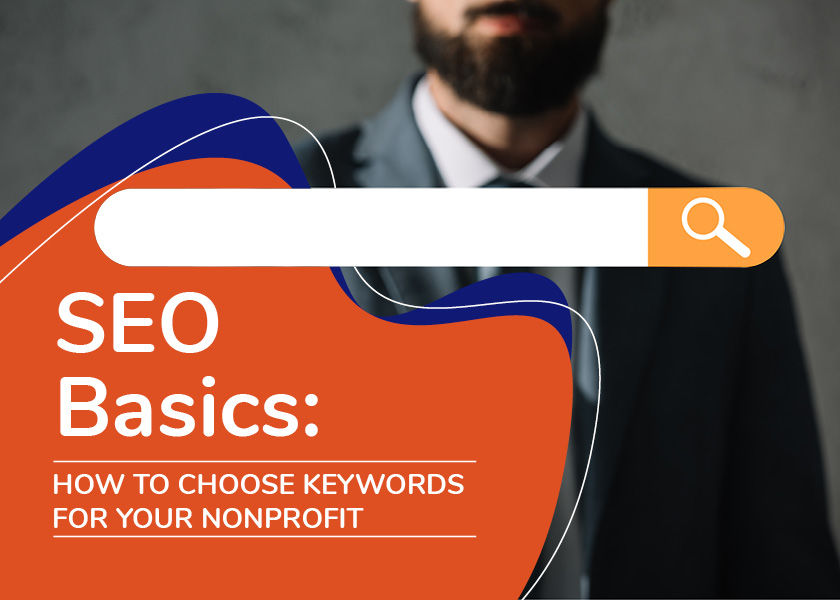SEO Basics: How to Choose Keywords for Your Nonprofit

Nonprofit marketing technology evolves quickly, and strategies change along with it. Currently, one of the top buzzwords in nonprofit marketing is search engine optimization (SEO). SEO is a measure of how easy it is for users to find your nonprofit’s website. For instance, websites with a variety of high-value content that get shared by users across the internet are better optimized for search engines than nonprofit websites that haven’t been updated in five years.
One of the core building blocks of SEO is a strong keyword strategy. Keywords include all the words and phrases a visitor enters into a search engine to find the content they’re looking for. Part of nonprofit marketing now requires nonprofits to consider what keywords potential supporters are searching for and how they can make sure their website shows up when those keywords are searched.
The first step in this effort is choosing effective keywords. While this might seem simple on the surface, you might find yourself spending hours researching and breaking down your website’s keyword priorities and current rankings. To help streamline your research, this guide will walk through different types of keywords and the factors nonprofits should consider when choosing keywords.
Understanding Keyword Types
When choosing the keywords your nonprofit should target, you need to factor in keyword types. In the early days of search engine technology, search engines would assess pages based on how many times a keyword appeared. However, this led to keyword stuffing, wherein websites would add many highly searched keywords to their pages, even if they were unrelated to the rest of the website’s content.
To combat this, modern search engines use more complex formulas in an effort to present users with content that is valuable and relevant to their keyword search. As part of this formula, Google considers multiple types of keywords. Getting Attention’s Google Grant keyword guide offers an overview of the main types of keywords relevant to nonprofits interested in SEO:
- Exact. An exact keyword is the specific keyword that your organization is targeting. For example, a nonprofit focused on providing continuing education programs for adults might focus on the exact keyword “continuing education courses” to attract new program participants.
- Broad. Broad keywords include the potential variations that visitors might use when entering search queries related to your keyword. Using the same example as before, broad keywords would include searches like “adult education courses” and “continued learning program.”
- Phrase. Phrase keywords include the exact keyword, as well as other words and phrases. For the keyword “continuing education courses,” a phrase keyword might be “continuing education courses near me.”
Understanding various keyword types will help you create keyword-optimized content that is natural and avoids keyword stuffing. Using broad and phrase keywords accounts for a wider audience who is interested in your nonprofit’s content, but may be thinking about the topic in slightly different language.
These keyword variations apply to other search engines, as well. For example, if you’re considering applying for the Microsoft Ad Grant in addition to the Google Ad Grant, you can use your existing knowledge of keyword types to continue making valuable content that will appear for the right search terms.
Keyword Factors
The right keywords can help your nonprofit achieve a variety of goals, including attracting new volunteers, promoting fundraisers, spreading awareness of your cause, and helping potential constituents find your programs.
Of course, there are a variety of factors that determine how likely your content is to rank highly for your target keywords. These include:
Relevance
Consider what type of content visitors want to find when they search specific keywords. Making content that’s relevant to users’ search queries will increase the chances that visitors who click on your website will take a specific action, such as donating. When you attract more visitors who then spend time on your website and have a positive experience, the engagement signals to search engines that your content is valuable, helping your website rank higher.
For example, let’s say your nonprofit is hosting an online charity golf tournament. In this case, a keyword like “golf tournament” likely has more search traffic than “online charity golf tournament.” However, individuals interested in golf tournaments in general may have a variety of purposes, such as finding local golfing locations or joining a golf club. While you could try to rank for the keyword “golf tournament,” your content is unlikely to have high relevance for users searching that keyword.
You can use Google Analytics to check which keywords supporters are searching for that lead them to your content and what actions they take once they arrive on your website. Double the Donation’s guide to Google for Nonprofits walks through how charitable organizations can get access to Google Analytics and other Google workplace tools for free.
User Intent
In addition to making content that’s relevant to your visitors, consider your different visitors and their purposes for clicking on your website. Try creating user personas for your website. For nonprofits, these might include:
- Donors. Donors are individuals looking to give to a cause they care about. For these individuals, content that explains your target issue and the work your organization does to combat it is essential. While you ultimately want these visitors to convert by making a donation, they are likely to be interested first in informational content.
- Volunteers. Volunteers likely also want to see educational content like donors. However, they differ by having a stronger focus on location and specific volunteer opportunities. Keywords related to volunteering and your community can be useful for these supporters. Try optimizing your volunteer opportunities page for a keyword such as “[town/city] volunteer opportunities.”
- Beneficiaries. Beneficiaries need help, and your website should have multiple pages explaining what your programs do and how they can sign up to receive aid. These individuals are likely to search keywords that are questions or related to their location, like “Where can I receive food assistance?” and “Housing programs near me.”
For your fundraising campaigns, consider the type of content new donors are likely looking for. This might include informational pages about your programs, research about your target issue, and stories from specific beneficiaries about how your organization has helped them.
Competition
Your nonprofit is one organization among many trying to stand out on search engine results pages. As such, each keyword you target likely has at least a few other websites also trying to rank for it.
Levels of competition vary depending on the keyword. Think back to the virtual golf tournament fundraiser. A keyword like “golf” likely has thousands or even millions of searches a month. However, you would likely compete with a variety of organizations attempting to rank for this keyword, such as pro-golf leagues and massive companies that sell golfing equipment.
In most cases, these organizations have far more resources to dedicate to SEO marketing than even a decently sized nonprofit and will likely outrank your organization. Although a keyword like “virtual charity golf tournaments” will have far less traffic than just “golf,” it will also have less competition, making it easier for your nonprofit to rank.
If your nonprofit needs help managing your ad campaigns and identifying keywords to go after, consider working with a Google Grants manager. They can bring their expertise to help you identify keywords that you are likely to rank for, have low competition, and are relevant to your various audiences.

